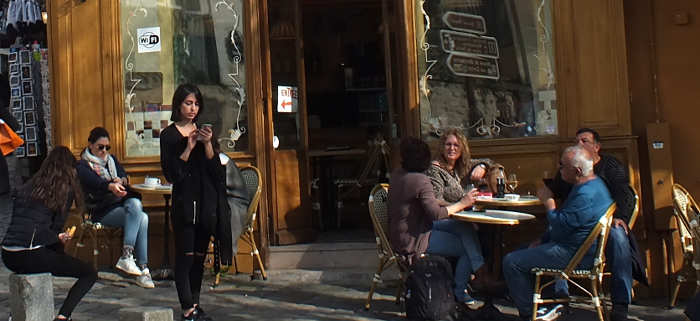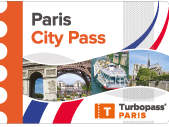
Staying safe and avoiding trouble in FranceAbout-France.com - A thematic guide to France |
Keeping out of harm's way in France
| Cities | Vehicles | Singles |
| Phones and laptops | Tickets | Cash & valuables |

EMERGENCY
? Check out Paris
Emergency phone numbers - doctors, hospitals, pharmacies,
consulates
To be honest, France is a fairly safe country.
Yet like any country, it has its share of crooks, pickpockets, potential terrorists, thieves and even mere opportunists, who can turn a traveller's dream into a nightmare. While anyone anywhere could be the victim of an accident or a terror attack, this is highly unlikely to happen to a tourist, anywhere. Most tales of woe and distress scattered across travel forums on the Internet relate to less serious, but nonetheless unpleasant experiences such as losing your luggage, having your passport stolen, getting mugged, or some other mishap.There was the story of the tourists who left their hire car by the seaside in Nice, only to come back and find that while they were down having a quick dip in the Med, some unscrupulous scoundrel had broken a window and stolen their passports, valuables, cameras, laptops and some of their luggage – without so much as a by-your-leave.
In cases like this, one's reaction must surely be mixed, between compassion for the victims who lost a lot of stuff, and disbelief at their stupidity for - presumably - leaving their bags, documents, cameras and valuables visible in an unattended car parked in a very public location in a Mediterranean city.
In France, as in virtually any other country worldwide, people who are careless or stupid with their belongings, and notably with their valuables, are liable to get them nicked, stolen or otherwise removed by thieves pickpockets or con-men. Thieves and pickpockets are particularly attracted to foreign-looking tourists, notably wealthy-looking tourists, since there is a good chance that they will be carrying money, credit cards, passports or other items of value that can be sold on the black-market.
How to stay safe and avoid trouble
So to avoid trouble, it is a good idea to pay attention to a few elementary truths and rules.1. Cities with lots of wealth and lots of wealthy tourists also attract thieves and criminals. So the places in France where tourists should be most on their guard and take most precautions are Paris and Nice . Both of these cities have seen a rise in acts of theft and aggression against tourists in recent years, notably on account of the development of organised crime networks from Eastern Europe.
Watch out for instance for loitering groups of young teenage girls in the Paris metro. While the vast majority of people ride the metro every day with not least worry or hassle, there are organised bands of mostly east European pickpockets and snatch and grab thieves at work in Paris, looking out for unwary tourists. So keep your valuables in inside pockets, and keep a firm grip on your bags if riding the Paris metro, or even just waiting in line for a taxi.
2. Unattended cars can also attract the attention of thieves, particularly up-market models and cars left with interesting-looking items visible to the eyes of passing prowlers. This is particularly true in cities and at night. Once again, in most places in France most people have absolutely no problem; but drivers who unintentionally invite trouble by leaving valuables or documents in full view of any passer-by may pay the price of their thoughtlessness.
In many regions of France, particularly in small towns and villages , you could leave a Rolls-Royce or a BMW on the street for a week, with the keys in the ignition, and it would still be there when you got back; but in any city, motorway service area, tourist trap or seaside resort, a lot more care is advisable. Don't leave passports and money in an unattended car, even if it is locked; and stash "interesting" looking items out of harm's way in the boot (or the trunk as Americans say), or in a locked glove compartment.
3. Cash, credit cards and passports. Keep your cash, credit cards and passports with you at all times, and do not carry unnecessary amounts of cash with you. Credit cards can be used virtually everywhere in France, so there is little need for tourists to carry rolls of banknotes on their person. Tourists brandishing 100 Euro notes (let alone anything bigger than that) can attract attention. Outside of hotspots of opulence such as Saint Tropez, Cannes and some parts of Paris, 100 Euro bills are relatively rare – and 200 € or 500 € bills are virtually unknown.
4. Mobile phones, laptops, iPads, USB sticks, expensive cameras, Rolex watches,etc. Don't flaunt your wealth or your trendiest and valuable possessions. Smartphones in particular seem to have a magnetic attraction for all kinds of pickpockets and even just ordinary teenagers who, as Oscar Wilde once put it, "can resist anything except temptation". As regards laptop computers, IPads and USB sticks, make sure that your operating system (Windows or whatever) is protected by a password. This won't stop anyone from stealing your computer, it won't prevent you accidentally leaving it on a train or in a hotel.... but it will mean that whoever stole it or acquires it will find it very hard to access your information and steal your passwords. For anyone except a seriously motivated computer hacker or expert, there is no way of entering into the files on a password-protected laptop, so in most cases the thief will simply reformat the hard disk and erase all your files.
5. Travel tickets / printouts. As far as is possible, leave these in your hotel room, in a suitcase or safe, unless you need them. If touring round, keep them either on your person, or else in the locked glove compartment of your car or other secret hideaway. Don't keep travel tickets solely on your phone; always have a printout or backup somewhere else, that you are able to access. Losing a phone can be an unnerving experience; losing a phone with all your travel tickets and hotel reservations on it can be traumatic.
6. Single travellers Travelling alone in France is generally not a risky business; millions of people travel alone in France every year, for business or for pleasure. However female travellers should take the elementary precautions that they would take anywhere outside their own home, such as not using public transport late at night, and not venturing alone into urban areas of doubtful reputation.
 Obey
these few basic principles,
which are really just plain common sense, and it is most likely that
your holiday in France will go off without any trouble. Disregard them,
and you will be courting problems that could ruin your trip.
Obey
these few basic principles,
which are really just plain common sense, and it is most likely that
your holiday in France will go off without any trouble. Disregard them,
and you will be courting problems that could ruin your trip.If, in spite of taking all the sensible precautions, you are the victim of theft or aggression, you should report this immediately to the nearest gendarmerie. In the event of theft of passports or identity papers, contact the nearest consulate for your country. In the event of loss of travel tickets, contact your airline or other transport company.
One useful tip to finish with: carry colour photocopies of the essential pages of your main documents and travel papers, and keep these well separate from the originals. If you do need to declare a loss or theft, having copies of the missing documents can make life a bit easier.
Minimise the risk
Rather than visit Paris or France's main tourist sites, visit France's small towns, its regions, or its out of the way areas. As in any country, criminality and acts of terror tend to be concentrated in places that are full of people, the cities and main lines of communication between them. France has just a handful of popular big cities; most of France, and indeed the majority of the interesting things and places to visit, are away from the cities.Rural France has just as much to offer as urban France, even if it just for a weekend break. While the best-known airports are in Paris and Nice, many French airports are located in or outside small provincial towns, in areas where there's far more than enough to see and do to keep anyone happy for a short break; and many parts of rural Frence remain areas where you can leave the house or a hotel room without bothering to lock the door, in the knowledge that nobody will break in while you're out.
Want a great view? No need to go up the Eiffel Tower in Paris. You could instead take the rack railway to the top of the Puy de Dome in Auvergne, or drive to the Point Sublime above the Tarn Gorge in Occitania... just two of hundreds of great views to be had in France. Want to see a great cathedral? Now that Notre Dame in Paris is - alas - off limits for the forseeable future, it's good to know that there are a dozen other great (some would say greater) medieval cathedrals in other French cities, with less crowds, no need for security, and incredible medieval sculptures and stained glass windows. Want to visit some great museums and art galleries? There are plenty of them outside Paris, places where you won't be able to see the Mona Lisa, but you won't either need to stand in a line for half an hour or more before you can get in. Check out some of the best on Best French art galleries.
There's so much to see in France, far away from the big cities, in smaller cities and in the countryside; and while it's not possible to talk of "zero risk" for any place anywhere, most af rural France is pretty well as safe as it gets.
To
contact About-France.com, use the form provided. See site
information page
Copyright notice: Website and text © About-France.com 2007 - 2025 except where otherwise indicated.
| ►► Site guide |
| About-France.com home |
| Full site index |
| About-France.com site search |
| ►► Principal chapters on About-France.com : |
| Guide
to the
regions of France Beyond
Paris, a guide to the French regions and their tourist attractions.
|
| Guide
to Paris Make
the most of your trip to Paris; Information on attractions, Paris
hotels, transport, and lots more.
|
| Accommodation
in France
The different options, including hotels,
holiday gites, b&b, hostels and more
|
| Tourism
in France
The
main tourist attractions and places to visit in France - historic
monuments, art galleries, seasides, and more
|
| Planning
a trip to France
Information
on things to do before starting your trip to France.
|
| Driving
in France
Tips
and useful information on driving in and through France - motorways,
tolls, where to stay....
|
| Maps
of France
Cities,
towns, departments, regions, climate, wine areas and other themes.
|
| The
French way of
life
A mine of information about
life and living in France, including
working in France, living in France, food and eating, education,
shopping.
|
| A-Z
dictionary of France Encyclopedic
dictionary of modern France - key figures, institutions, acronyms,
culture, icons, etc.
|
| ►► More accommodation |
| Gites in France |
| Bed & breakfast in France |
| Small rural campsites |
| Small hotels in France |
